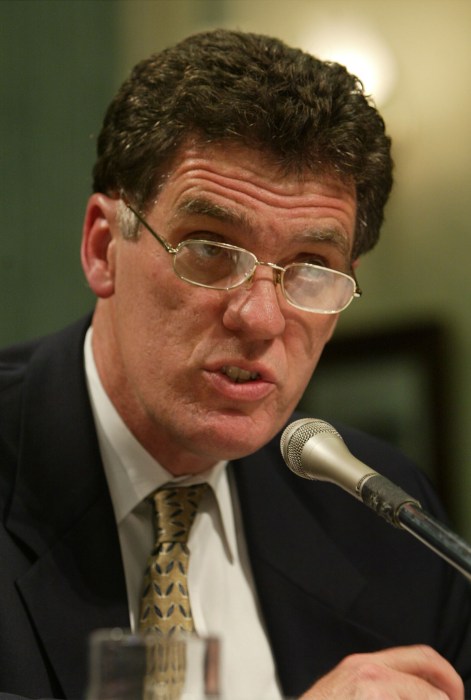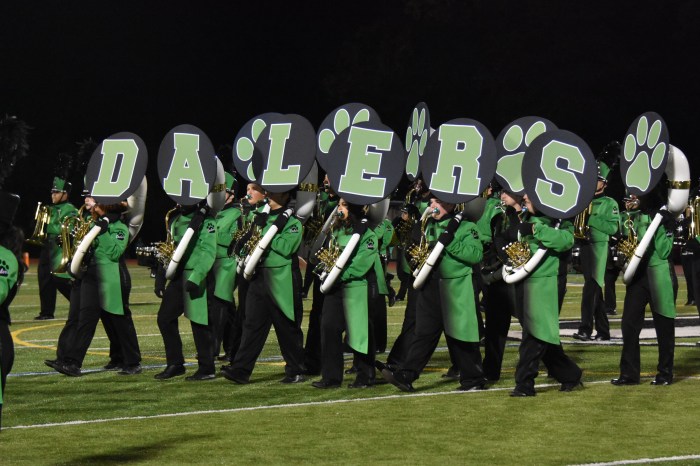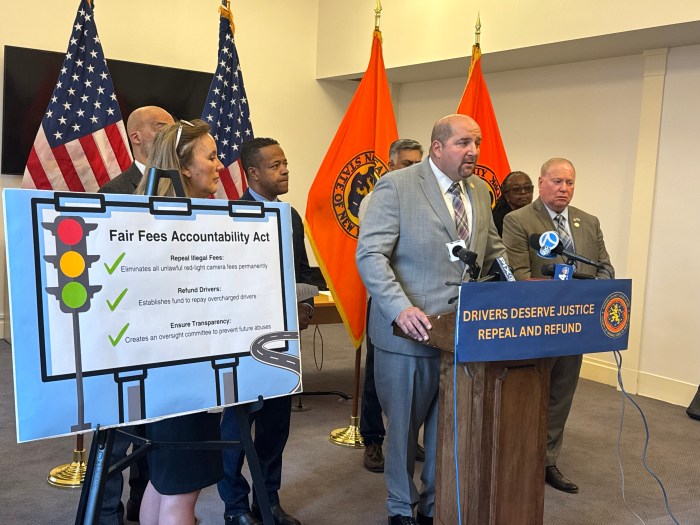New Bill Saves Farmingdale Taxpayers From Huge Expense
Reaching “across the aisle” to preserve the integrity of upcoming village elections, New York State Senator Jack Martins, a Republican, and New York State Assemblywoman Michelle Schimel, a Democrat, fought hard, together, to bring forward an amendment to state law that allows villages to use the old lever voting machines in this year’s village elections. The March 15 local elections, and the upcoming June elections, would have proved an extremely costly affair for villages as the new Nassau County machines are not available and without the law, villages would have been forced to either rent scan machines at an exorbitant cost or hold their elections by using paper ballots which cost $.55 each.
Local Long Island mayors, under the leadership of the Great Neck Village Officials Association and the Nassau County Village Officials Association, worked long and hard to support the legislators’ efforts. Both GNVOA President J. Leonard Samansky, mayor of the Village of Saddle Rock, representing Great Neck’s nine villages, and NCVOA President Marvin Natis, representing Nassau County’s 64 villages, were at the press conference.
As a large crowd of Nassau County mayors, deputy mayors and village trustees gathered for a press conference at Great Neck House last Friday morning, March 4, the senator and the assemblywoman were introduced by Village of Great Neck Mayor Ralph Kreitzman, who also serves as vice president of the GNVOA and treasurer of the NCVOA. The mayor explained that this “critical legislation” sponsored by Senator Martins and Assemblywoman Schimel “clearly demonstrates that they understand and support local government, the government that is closest to the people and which is most efficient and responsive to their needs.”
Mayor Kreitzman further explained that, thanks to these state legislators, “we now have some time to resolve yet another difficult and costly, unfunded state mandate that was thrust upon our villages.” He said that this “great effort means that our residents will be able to vote in our upcoming village election, in this historic building, using the lever voting machines they know and understand, and at substantially less cost to the village.”
Assemblywoman Schimel spoke first, stating that she wished the governor “could be here to see this vibrancy.” She said that both she (a former town clerk) and Senator Martins (a former village mayor) “know firsthand about local government.” She noted how they had “worked across the aisle for New York State.”
The assemblywoman thanked NYCOM (New York Conference of Mayors) and the village officials associations for their strong support. And, with all of the local support, “they really paid attention to us in Albany,” Assemblywoman Schimel stressed. The assemblywoman also thanked Governor Andrew Cuomo for promptly signing the law.
Said Michelle Schimel: “Village government is truly the grassroots of democracy.”
Senator Martins thanked “my assemblywoman,” and went on to state that “we must remember people first … and that they have to have the ability to vote.” The senator emphasized how “important” it was “to get it right.” And he said that it was Michelle Schimel “who really made it work. Senator Martins, too, spoke of how “we worked together across the aisle.”
Senator Martins said that this new law is “the first chapter of 2011,” the first bill Governor Cuomo signed into law. And he also thanked NYCOM, the two VOA organizations, and “every mayor and trustee who helped make a difference with their support.”
Mayor Natis, mayor of the Village of North Hills, speaking on behalf of the NCVOA, noted that this law only provides for help for village voting until the end of 2012. Stressing the importance of local government, he stated: “we see our residents as our friends and neighbors … so we have to be responsive.” Mayor Natis, too, thanked all of the mayors, deputy mayors and trustees for their support.
Representing the GNVOA, Mayor Samansky spoke of “every village in New York State under attack.” He said that, with adoption of this bill, two things were accomplished: the right to vote and the saving of huge amounts of money. “If the governor was here maybe we could show him how to do a proper budget,” he said, adding, “The state wants to take money from the villages.” Mayor Samansky then added: “Let the governor do his job in Albany; we are doing our jobs.”
Speaking again, Senator Martins reminded everyone that they must now re-evaluate the election law and the amendment through Dec. 31, 2012, when the amendment expires. Local elections, he said, must be addressed. The senator said that the “lever machines worked” and that it “made no sense” to go back to paper ballots, especially with such high costs involved for small village elections.
Assemblywoman Schimel reminded the audience of local elected officials that “You were heard and you were listened to … you have more power than you think you have.”
And Senator Martins reminded everyone that “Albany looks at the world from 30,000 feet … you don’t see people on the ground … but we know, we have the perspective … it all comes back to people and local communities like ours.”
Ending the press conference, Assemblywoman Schimel said that this has been “a process,” and though we now have a short-term plan, we also need a long-term plan.
Senator Martins added, “We do have other work to do.”
He said that other municipalities, such as special districts, also need help solving their voting machine issues.
Mayor George Starke of Farmingdale later told the Observer, “A big ‘thank you’ to new Senator Jack Martins and Assemblywoman Michelle Schimel for sponsoring the legislation; this could have been a huge waste of taxpayer money when we can least afford it.”
“It is a two-year bill that will extend beyond our [Farmingdale’s] 2012 Village election and allow us to use lever machines,” added Farmingdale’s Deputy Mayor Patricia Christiansen. “Had the bill not been passed, the Village would have had to rent scanners at $1,500 each and order paper ballots for 110 percent of its registered voters at 55 cents each. These costs would have far exceeded that which we typically spend for a Village election.”
Under the new amendment to the state voting law, the villages are only exempt from using the new digital voting machines until Dec. 31, 2012.




























